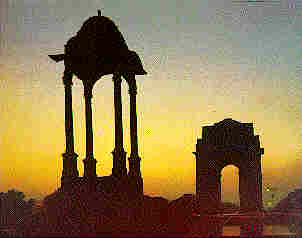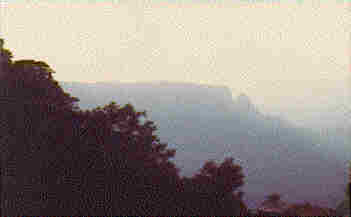
(Seen here is the India Gate at New Delhi.)
|
_________________________________________________
In this chapter we have seen up to now, what conditions are favourable to the existence of a secular state. Now we shall outline what Secularism actually is and what are Secularism's intellectual moorings.
Most of us do not know what Secularism is?
The Concise Oxford Dictionary of Current English offers the following definition of the term Secular. "Concerned with affairs of this world, worldly, not sacred, not monastic, not ecclesiastical, temporal, profane, lay, sceptical of religious truth or opposed to religious education, etc."
 | Our Human species still has a long way to go towards the Ultimate Goal of One Single World State of Humankind where the Global Outlook of all of us would be Rationalist and Humanist. This would be the Dawn of the human age and human history the world over. This would also mark the end of the pre-history of Man which we are still living through. A pre-history of the division of humankind along national, religious, linguistic, ethnic and other lines. Lines along which there has been hatred, violence and bloodshed all through past human history. (Seen here is the India Gate at New Delhi.) |
This definition is full of many negative adjectives. It spells out all that secularism is not without saying much about what Secularism is or what is should be. This is what we shall try to examine below. The author is in agreement with the negative connotations given by the Oxford Dictionary but beyond this can we answer the question 'What is Secularism?'
Secularism is the Political Expression of Rationalism
As pointed out earlier in this chapter, Secularism is the political expression of Rationalism. And now what is Rationalism ? Rationalism is, as per the Oxford Dictionary, 'An attitude which is "endowed with reason, reasoning: sensible, sane, moderate, not foolish or absurd or extreme; of or based on reasoning or reason, rejecting what is unreasonable or cannot be tested by reason". It adds that rationalism expresses "doubts about the truth of divine revelation, the possibility of miracles, etc." Thus this definition has much to say what rationalism is.
The Rationalist Outlook
From the above definition and from the popular understanding we can say that rationalism is an attitude by which human beings always try to explore and explain the unknown and by doing this they try to extend the frontiers of human knowledge. Nothing in rationalism is ever an article of faith, everything in rationalism is subject to inquiry, and inquiry is never given up.
Any phenomenon which comes within human understanding should be such that can be explained to any human being who is qualified in that discipline. Nothing can remain en exclusive preserve which can be mastered only by "Godmen" claiming "special" powers.
There has to be no sinister shroud of secrecy around any fact or method that has been mastered by human intellect, according to the rationalist attitude Hence nothing in rationalism is an article of faith except the attitude of inquiry. Rationalism is hence an attitude of inquiry from end to end. It does never entertain any dogmas, rituals and beliefs whatsoever which are to be followed unquestioningly. Rationalism does not have the word faith in its dictionary.
 | There will forever exist in the Cosmos, infinite phenomenon, which would remain unknown to human beings. But however tough (and to some humans - frightening) this challenge facing us, a rationalist would pursue the objective of trying to unravel it, and this objective, we rationalists would pursue forever, generation after generation. This is the essence of Rationalism, the intellectual bedrock of Secularism. And Secularism is the political expression of this Rationalist attitude. |
Thus no one can ever be "converted" to rationalism. The taking up of a rationalist attitude can be decided by a person for himself individually. The taking up of a rationalist attitude presumes that dogmas have been entirely eliminated from the persons mind. The shift to rationalism is no doubt a process of transition, it is a battle for the conquest of one's own mind from the stranglehold of dogma.
A charge very often made against the rationalists in apparently quite a convincing manner is that as rationalists refuse to accept any phenomenon that is beyond human understanding they wrongly deny the existence of many such phenomenon. Examples like the existence of Ghosts, Haunted houses, trees, caves, the presence of Psychic Powers, Telepathy, Reincarnations, etc., are put forward which many people feel exist and to vouch for whose existence respectable individuals can come forward.
The rationalists, these people say, deny the existence of such phenomenon because their occurrence cannot be explained with the existing human knowledge. But the fact is that, not only are such phenomenon beyond human knowledge, but a part of phenomenon will always remain beyond Human knowledge. And for this reason we cannot, as rationalists, say that it would do good for everybody to believe and fear the unknown. In denying the existence of such phenomenon these believers say, the rationalists are making a mistake.
But the rationalists do not deny anything, in fact rationalists neither assume the existence or non-existence of anything at all. With their minds free of any pre-conceived notions whatsoever the rationalists try to penetrate the unknown and try to bring more phenomenon from the sphere of unknown to that of the known. In going about this inquiry a person can use all the senses of perception available to him/her. Any phenomenon that can be so perceived is within human understanding.
If there is any phenomenon beyond the human senses of perception human beings will not know of its existence hence their would be no question of entertaining any idea of its existence. And if at all humans come to know some way that such a phenomenon does exist and such a phenomenon is beyond the available senses of perception, a rationalists will endeavour to devise a method or a new sense of perception to understand and if possible to master that phenomenon. In doing this human beings may or may not be successful. But success is another issue, what matters is the question of what attitude to take as regards such partly known phenomenon. A rationalist would like to explore it, a dogmatic person would like to treat is as a deity.
 | More than 2,500 years back, Gautama Buddha propounded an outlook that was both humanitarian and rationalist. Buddhism did not advocate invocation of any God. The original Buddhism had neither God nor Devil. The emphasis was not on prayer but on controlling one's mind. In this sense Buddhism was more a worldly philosophy rather than a religion. It was later on that it became a religion complete with rituals, icons, holymen and dogmas. However, in its original principles, it came closest to Rational-Humanism. |
A rationalist would agree that there today exist definite limits to human knowledge and there would always exist limits to this knowledge. Thi8 is so as there will always be many (rather infinite) phenomenon, which would remain unknown to human beings. We would never be able to offer an explanation for everything. But however tough and frightening the challenge facing us, the rationalists would pursue the objective of trying to unravel it and this objective the rationalists would pursue forever, generation after generation. This is Rationalism, the intellectual bedrock of Secularism. And Secularism is the political expression of this rationalist attitude.
THE POLICY OF A SECULAR STATE TOWARDS RELIGION
Having seen what the intellectual bedrock of Secularism is, we shall now turn to the ace question of what should be the policy of a State that is Secular according to the dictionary meaning of the term?
Assuming that the state which professes secularism to be its policy, also professes the concurrent policy of rationalism, the attitude of the state would have to be of looking at religion as a transitory phenomenon. The long term declared objective of the state should also be of gradually replacing religious beliefs with scientific temper. The state would naturally be equidistant from the various religions (i.e. the various forms of theism). The state policy would also be of being evenhanded as far as different religions go. But the undercurrent of this policy should not be to give equal encouragement to all religions (as the Hindu state did in ancient times) but to regulate in an impartial manner the process of transition from belief in the various religions to a scientific rationalist attitude.
This being the declared aim of state policy, the state cannot be non-committal or passive towards the existence of religious beliefs. The state policy should be infused with a missionary zeal to combat religious attitudes in an aggressive manner. But while doing this the secular state need not follow the repressive policies of persecution which have so far been followed by theocratic states towards religions other than the one patronised by them. The Secular State in fact should allow the right of religious worship along with that of anti-religious propaganda. Religion being an instrument of personal salvation and unity with the supreme - as religious theologians understand religion, freedom of religious worship should be guaranteed in a Secular State. But along with this, there should be the right for anti-religious propaganda which should be backed by the state in line with the declared policy of replacing religious belief with scientific temper.
 | Only Rationalism, and its corollary - Humanism, can finally shape the destiny of humankind in facing challenges which are beyond our knowledge and imagination and beyond our planet, when we together as one species prepare ourselves to face SPACE - the Final Frontier of the UNKNOWN. |
The battle of rationalism which is basically an intellectual outlook, would have to be a battle for the conquest of human minds. And it is only this outlook; Rationalism, and its corollary - Humanism, that can finally shape the destiny of humankind in facing challenges which are beyond our knowledge and imagination and beyond our planet, when we together as one species prepare ourselves to face SPACE - the Final Frontier of the UNKNOWN.
_________________________________________
Now let us go on to the last chapter of this site on Humanism and Sign-off.
________________________________
_________________________________________________
____________________________________
|
|
_ _ _ |
View My Guestbook
|
_______________________________________
_________________________________